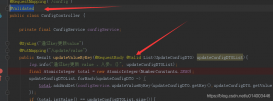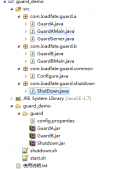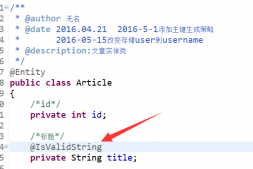如下所示:
![Java List集合返回值去掉中括号(''[ ]'')的操作 Java List集合返回值去掉中括号(''[ ]'')的操作](/uploads/allimg/200828/1-200RR12446.jpg)
调用StringUtils工具类的strip()方法去掉中括号"[ ]":
StringUtils.strip(word.toString(),"[]") //第一个参数放集合,第二个参数去掉中括号"[]"
StringUtils工具类代码:
![Java List集合返回值去掉中括号(''[ ]'')的操作 Java List集合返回值去掉中括号(''[ ]'')的操作](/uploads/allimg/200828/1-200RR12447.jpg)
|
1
2
3
4
5
6
7
8
9
10
11
12
13
14
15
16
17
18
19
20
21
22
23
24
25
26
27
28
29
30
31
32
33
34
35
36
37
38
39
40
41
42
43
44
45
46
47
48
49
50
51
52
53
54
55
56
57
58
59
60
61
62
63
64
65
66
67
68
69
70
71
72
73
74
75
76
77
78
79
80
81
82
83
84
85
86
87
88
89
90
91
92
93
94
95
96
97
98
99
100
101
102
103
104
105
106
107
108
109
110
111
112
113
114
115
116
117
118
119
120
121
122
123
124
125
126
127
128
129
130
131
132
133
134
135
136
137
138
139
140
141
142
143
144
145
146
147
148
149
150
151
152
153
154
155
156
157
158
159
160
161
162
163
164
165
166
167
168
169
170
171
172
173
174
175
176
177
178
179
180
181
182
183
184
185
186
187
188
189
190
191
192
193
194
195
196
197
198
199
200
201
202
203
204
205
206
207
208
209
210
211
212
213
214
215
216
217
218
219
220
221
222
223
224
225
226
227
228
229
230
231
232
233
234
235
236
237
238
239
240
241
242
243
244
245
246
247
248
249
250
251
252
253
254
255
256
257
258
259
260
261
262
263
264
265
266
267
268
269
270
271
272
273
274
275
276
277
278
279
280
281
282
283
284
285
286
287
288
289
290
291
292
293
294
295
296
297
298
299
300
301
302
303
304
305
306
307
308
309
310
311
312
313
314
315
|
package com.ktamr.common.utils; import com.ktamr.common.core.text.StrFormatter; import java.util.Collection;import java.util.Map; /** * 字符串工具类 * * @author ktamr */public class StringUtils extends org.apache.commons.lang3.StringUtils{ /** 空字符串 */ private static final String NULLSTR = ""; /** 下划线 */ private static final char SEPARATOR = '_'; /** * 获取参数不为空值 * * @param value defaultValue 要判断的value * @return value 返回值 */ public static <T> T nvl(T value, T defaultValue) { return value != null ? value : defaultValue; } /** * * 判断一个Collection是否为空, 包含List,Set,Queue * * @param coll 要判断的Collection * @return true:为空 false:非空 */ public static boolean isEmpty(Collection<?> coll) { return isNull(coll) || coll.isEmpty(); } /** * * 判断一个Collection是否非空,包含List,Set,Queue * * @param coll 要判断的Collection * @return true:非空 false:空 */ public static boolean isNotEmpty(Collection<?> coll) { return !isEmpty(coll); } /** * * 判断一个对象数组是否为空 * * @param objects 要判断的对象数组 ** @return true:为空 false:非空 */ public static boolean isEmpty(Object[] objects) { return isNull(objects) || (objects.length == 0); } /** * * 判断一个对象数组是否非空 * * @param objects 要判断的对象数组 * @return true:非空 false:空 */ public static boolean isNotEmpty(Object[] objects) { return !isEmpty(objects); } /** * * 判断一个Map是否为空 * * @param map 要判断的Map * @return true:为空 false:非空 */ public static boolean isEmpty(Map<?, ?> map) { return isNull(map) || map.isEmpty(); } /** * * 判断一个Map是否为空 * * @param map 要判断的Map * @return true:非空 false:空 */ public static boolean isNotEmpty(Map<?, ?> map) { return !isEmpty(map); } /** * * 判断一个字符串是否为空串 * * @param str String * @return true:为空 false:非空 */ public static boolean isEmpty(String str) { return isNull(str) || NULLSTR.equals(str.trim()); } /** * * 判断一个字符串是否为非空串 * * @param str String * @return true:非空串 false:空串 */ public static boolean isNotEmpty(String str) { return !isEmpty(str); } /** * * 判断一个对象是否为空 * * @param object Object * @return true:为空 false:非空 */ public static boolean isNull(Object object) { return object == null; } /** * * 判断一个对象是否非空 * * @param object Object * @return true:非空 false:空 */ public static boolean isNotNull(Object object) { return !isNull(object); } /** * * 判断一个对象是否是数组类型(Java基本型别的数组) * * @param object 对象 * @return true:是数组 false:不是数组 */ public static boolean isArray(Object object) { return isNotNull(object) && object.getClass().isArray(); } /** * 去空格 */ public static String trim(String str) { return (str == null ? "" : str.trim()); } /** * 截取字符串 * * @param str 字符串 * @param start 开始 * @return 结果 */ public static String substring(final String str, int start) { if (str == null) { return NULLSTR; } if (start < 0) { start = str.length() + start; } if (start < 0) { start = 0; } if (start > str.length()) { return NULLSTR; } return str.substring(start); } /** * 截取字符串 * * @param str 字符串 * @param start 开始 * @param end 结束 * @return 结果 */ public static String substring(final String str, int start, int end) { if (str == null) { return NULLSTR; } if (end < 0) { end = str.length() + end; } if (start < 0) { start = str.length() + start; } if (end > str.length()) { end = str.length(); } if (start > end) { return NULLSTR; } if (start < 0) { start = 0; } if (end < 0) { end = 0; } return str.substring(start, end); } /** * 格式化文本, {} 表示占位符<br> * 此方法只是简单将占位符 {} 按照顺序替换为参数<br> * 如果想输出 {} 使用 \\转义 { 即可,如果想输出 {} 之前的 \ 使用双转义符 \\\\ 即可<br> * 例:<br> * 通常使用:format("this is {} for {}", "a", "b") - this is a for b<br> * 转义{}: format("this is \\{} for {}", "a", "b") - this is \{} for a<br> * 转义\: format("this is \\\\{} for {}", "a", "b") - this is \a for b<br> * * @param template 文本模板,被替换的部分用 {} 表示 * @param params 参数值 * @return 格式化后的文本 */ public static String format(String template, Object... params) { if (isEmpty(params) || isEmpty(template)) { return template; } return StrFormatter.format(template, params); } /** * 是否包含字符串 * * @param str 验证字符串 * @param strs 字符串组 * @return 包含返回true */ public static boolean inStringIgnoreCase(String str, String... strs) { if (str != null && strs != null) { for (String s : strs) { if (str.equalsIgnoreCase(trim(s))) { return true; } } } return false; } /** * 将下划线大写方式命名的字符串转换为驼峰式。如果转换前的下划线大写方式命名的字符串为空,则返回空字符串。 例如:HELLO_WORLD- HelloWorld * * @param name 转换前的下划线大写方式命名的字符串 * @return 转换后的驼峰式命名的字符串 */ public static String convertToCamelCase(String name) { StringBuilder result = new StringBuilder(); // 快速检查 if (name == null || name.isEmpty()) { // 没必要转换 return ""; } else if (!name.contains("_")) { // 不含下划线,仅将首字母大写 return name.substring(0, 1).toUpperCase() + name.substring(1); } // 用下划线将原始字符串分割 String[] camels = name.split("_"); for (String camel : camels) { // 跳过原始字符串中开头、结尾的下换线或双重下划线 if (camel.isEmpty()) { continue; } // 首字母大写 result.append(camel.substring(0, 1).toUpperCase()); result.append(camel.substring(1).toLowerCase()); } return result.toString(); }} |
补充知识:java List转String去掉[ 、]、空格
我就废话不多说了,大家还是直接看代码吧~
|
1
2
3
4
5
6
|
public static void main(String[] args) { String s = "[aasa, bbbbb]"; String s1 = s.replaceAll("(?:\\[|null|\\]| +)", ""); System.out.println(s1);} |
在list<String> toString后,会发现两边有[],且中间还有有空格产生。
解决办法如上代码所示,使用replaceAll正则匹配 [、]、空格。
以上这篇Java List集合返回值去掉中括号('[ ]')的操作就是小编分享给大家的全部内容了,希望能给大家一个参考,也希望大家多多支持服务器之家。
原文链接:https://blog.csdn.net/weixin_41595700/article/details/100077863

















